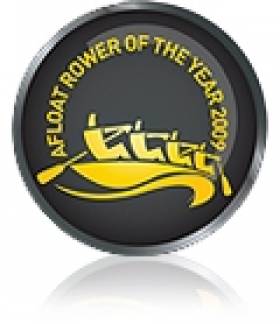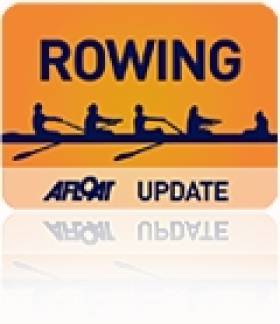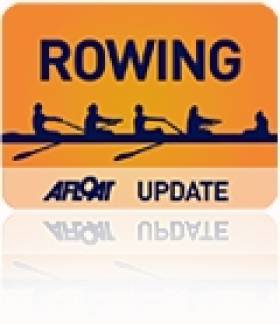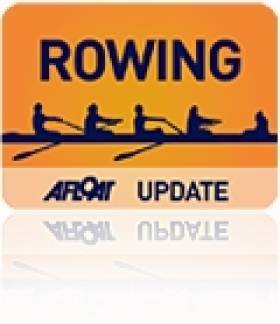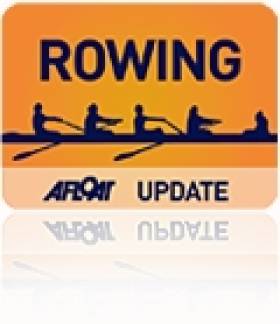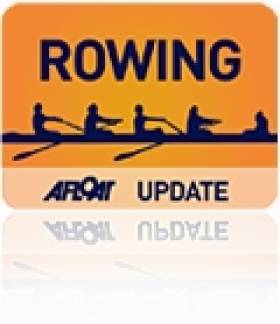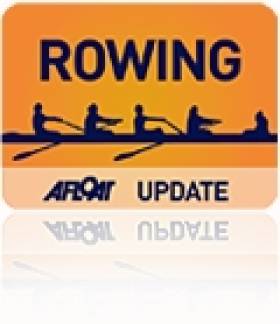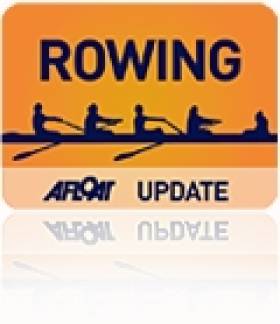Displaying items by tag: World Under23
Paul O'Donovan is Afloat Rower of the Year for 2013
# RowerOfTheYear: Paul O’Donovan is the Afloat Rower of the Year for 2013. The scholarship student at UCD raced to a bronze medal in the lightweight single sculls the World Under-23 Championships at Linz-Ottensheim in Austria in July. The previous month the 19-year-old had made his mark as a senior international when the reached the A Final at the World Cup Regatta at Dorney Lake, the Olympic venue, finishing sixth.
For these feats the Skibbereen man won the Afloat Rower of the Month Awards for June and July. He is a worthy recipient of the Afloat Rower of the Year Award for 2013.
Rower of the Year: The judging panel is made up of Liam Gorman, rowing correspondent of The Irish Times and David O'Brien, Editor of Afloat magazine.
#World Under-23Rowing: Paul O’Donovan took a bronze medal for Ireland at the World Under-23 Championships in Linz in Austria this morning. The 19-year-old Skibbereen man, who is a scholarship student at UCD, had a controlled race in the A Final of the lightweight single sculls. Andrew Campbell Jr of the United States was the strong leader from early on, while O’Donovan and eventual silver medallist Franciscus Goutier of the Netherlands stayed in the mix behind him. New Zealander Adam Ling did push to take bronze, but O’Donovan saw him off with his characteristic fast finish.
World Under-23 Rowing Championships, Linz, Austria, Day Five (Irish interest, selected results)
Men
Pair – B Final (Places 7 to 12): 1 Netherlands 6:47.87, 2 Hungary 6:49.68, 3 Slovenia 6:49.83, 4 Ireland (S O’Connor, F McQuillan-Tolan) 7:00.93, 5 Ukraine 7:03.46, 6 Lithuania 7:07.13.
Lightweight Double Sculls – B Final (Places 7 to 12): 1 Denmark 6:37.95, 2 Poland 6:40.97, 3 Lithuania 6:41.40, 4 Britain 6:44.76, 5 Norway 6:45.20, 6 Ireland (S O’Driscoll, G O’Donovan) 6:46.78.
Lightweight Single Sculls – A Final: 1 United States (A Campbell Jr) 7:07.84, 2 Netherlands (F Goutier) 7:10.49, 3 Ireland (P O’Donovan) 7:11.67; 4 New Zealand 7:12.44, 5 Turkey 7:18.84, 6 Britain 7:20.54.
Women
Lightweight Single Sculls – A Final: 1 Greece (A Nikolaidou) 7:58.12, 2 Belarus (A Kryvasheyenka) 8:02.79, 3 Japan (A Oishi) 8:06.68; 4 Belgium 8:09.10, 5 Austria 8:09.32, 6 Ireland (D Walsh) 8:14.47.
#WorldUnder-23Rowing: Denise Walsh finished sixth in the A Final of the lightweight single sculls at the World Under-23 Rowing Championships in Linz in Austria this morning. The Skibbereen woman and Belgium’s Eveline Peleman were not far off the pace at the back of the field in the first half of the race, but when Peleman moved away, Walsh struggled. The race was won by Aikaterini Nikolaidou of Greece.
Seán O’Connor and Fionnán McQuillan-Tolan finished fourth in the B Final of the men’s pair, 10th overall. The Netherlands were the premier crew throughout, and for most of the first half of the race Slovenia held second and Hungary and Ireland were in third and fourth. Hungary had a good second half and left Ireland behind and then caught and passed Slovenia at the finish, to take second.
In the men’s lightweight double sculls, Shane O’Driscoll and Gary O’Donovan finished sixth. Denmark won convincingly. Ireland looked a possibility for fourth, and 10th overall, but were passed by Lithuania and Britain in the second half of the race.
World Under-23 Rowing Championships, Linz, Austria, Day Five (Irish interest, selected results)
Men
Pair – B Final (Places 7 to 12): 1 Netherlands 6:47.87, 2 Hungary 6:49.68, 3 Slovenia 6:49.83, 4 Ireland (S O’Connor, F McQuillan-Tolan) 7:00.93, 5 Ukraine 7:03.46, 6 Lithuania 7:07.13.
Lightweight Double Sculls – B Final (Places 7 to 12): 1 Denmark 6:37.95, 2 Poland 6:40.97, 3 Lithuania 6:41.40, 4 Britain 6:44.76, 5 Norway 6:45.20, 6 Ireland (S O’Driscoll, G O’Donovan) 6:46.78.
Women
Lightweight Single Sculls – A Final: 1 Greece (A Nikolaidou) 7:58.12, 2 Belarus (A Kryvasheyenka) 8:02.79, 3 Japan (A Oishi) 8:06.68; 4 Belgium 8:09.10, 5 Austria 8:09.32, 6 Ireland (D Walsh) 8:14.47.
#WorldUnder-23Rowing: The Ireland women’s four finished fourth at the World Under-23 Championships in Linz in Austria today. The heat was so intense at the scheduled race time – a reported 40 degrees on the water – that the race had to be postponed for an hour. The Irish, who are a new crew, were well up to the pace in the race until about 1400 metres into the 2,000. The crew of Emily Tormey, Ailish Sheehan, Aifric Keogh and Lisa Dilleen held third behind dominant Australia and second-placed Russia, the bronze medallists last year. But the Irish crew clipped a buoy and New Zealand passed them. Australia took gold, Russia silver and New Zealand bronze.
World Under-23 Rowing Championships, Linz, Austria, Day Four (Irish interest, selected results)
Men
Four – B Final (places 7 to 11): 1 Croatia 6:14.55, 2 Lithuania 6:17.00, 3 Ireland (R Bennett, M Wray, J Mitchell, R O’Callaghan) 6: 19.24, 4 Norway 6:19.29. Britain did not start.
Pair - (First Three to A Final; rest to B Final) – Semi-Final One: 1 South Africa (D Hunt, V Breet) 6:46.15, 2 Greece (K Christomanos, A Dafnis) 6:49.16, 3 Serbia (M Vasic, R Deric) 6:49.47; 4 Hungary 6:50.31, 5 Ireland (S O’Connor, F McQuillan-Tolan) 6:59.77, 6 Lithuania 7:20.32.
Lightweight Double Sculls – (First Three to A Final; rest to B Final) – Semi-Final One: 1 Germany (M Moos, J Osborne) 6:36.55, 2 Italy (L Barbaro, S Molteni) 6:37.75, 3 Spain (J de Haz, J Zabala Artetxe) 6:37.88; 4 Poland 6:38.49, 5 Ireland (S O’Driscoll, G O’Donovan) 6:46.30, 6 Norway 6:48.13.
Lightweight Single Sculls – (First Three to A Final; rest to B Final) – Semi-Final One: 1 United States (A Campbell) 7:11.15, 2 Ireland (P O’Donovan) 7:12.58, 3 Britain (Z Lee-Green) 7:14.26; 4 Australia 7:22.67, 5 Italy 7:24.34, 6 Germany 7:28.69.
Single Sculls – D Final (places 19 to 24): 6 Ireland (A Boreham) 7:36.40.
Women
Four – A Final: 1 Australia (H Vermeersch, A Hagan, C Sutherland, L Stephan) 6:47.72, 2 Russia (T Afinogevova, E Tikhanova, A Tikhanova, A Zhukova) 6:53.92, 3 New Zealand (J Kearney, K Froude, K Walters, A Green) 6:53.97; 4 Ireland (E Tormey, A Sheehan, A Keogh, L Dilleen) 6:58.57, 5 Netherlands 7:02.00, 6 Poland 7:09.27.
Lightweight Single Sculls – (First Three to A Final; rest to B Final) – Semi-Finals Two: 1 Greece (A Nikolaidou) 7:54.92, 2 Austria (A Berger) 8:00.22, 3 Ireland (D Walsh) 8:00.28; 4 France 8:04.30, 5 Germany 8:11.25, 6 Cyprus 8:11.63.
#WorldUnder-23Rowing: Ireland’s Shane O’Driscoll and Gary O’Donovan finished third in their heat of the lightweight double sculls this morning at the World Under-23 Rowing Championships in Linz in Austria. France set the winning pace and Italy followed them into the second direct qualification place for the semi-finals. O’Driscoll and O’Donovan did not have the required fast first quarter, and despite competing hard in the middle stages the qualification place eluded them. They are now set for the repechages.
World Under-23 Rowing Championships, Day Two (Irish interest, selected results)
Men
Pair – (First Two Directly to A/B Semi-Finals; rest to Repechage) – Heat Two: 1 Australia (A Moore, A Hill) 6:37.37, 2 Ireland (S O’Connor, F McQuillan-Tolan) 6:49.15; 3 Russia 6:54.42, 4 Venezuela 7:05.10, 5 United States 7:09.48, 6 Estonia 7:15.64.
Lightweight Double Sculls – (First Two Directly to A/B Semi-Finals; rest to Repechage) – Heat Three: 1 France (D Piqueras, D Houin) 6:26.65, 2 Italy (L Barbaro, S Molteni) 6:31.96; 3 Ireland (S O’Driscoll, G O’Donovan) 6:37.40, 4 Russia 6:42.81, 5 Lithuania 7:05.01.
Women
Lightweight Single Sculls – (First Two Directly to A/B Semi-Finals; rest to Repechage) – Heat One: 1 Belgium (E Peleman) 7:46.06, 2 Ireland (D Walsh) 7:50.87; 3 Croatia 7:52.54, 4 Germany 8:00.47, 5 Israel 8:04.22, 6 Argentina 8:06.23.
Quadruple Misses Out on Semi-Final in Amsterdam
Ireland’s men’s lightweight quadruple scull failed to join the two women’s crews in the semi-finals of the World Under-23 Rowing Championships in Amsterdam. The crew of Shane O’Driscoll, Niall Kenny, Peter Hanily and Justin Ryan could only finish fifth in their repechage, where the top three qualified. Denmark and Switzerland headed the field, with Poland finishing well to take third. Britain were fourth and are set for the B Final alongside Ireland.
Lightweight single sculler Jonathan Mitchell finished third in his C/D semi-final and qualified for the C Final (places 13 to 18).
World Under-23 Rowing Championships, Day Three (Irish interest)
Men
Lightweight Quadruple Scull – Repechage Two (First Three to A/B Semi-Finals; rest to B Final): 1 Denmark 5:54.81, 2 Switzerland 5:56.16, 3 Poland 5:57.97; 4 Britain 6:00.23, 5 Ireland (S O’Driscoll, N Kenny, P Hanily, J Ryan) 6:04.17, 6 Austria 6:08.25.
Lightweight Single Scull – Quarter Final Four: 1 United States (A Campbell Jr) 7:11.51, 2 Greece (P Magdanis) 7:14.64, 3 Peru (R Leon Garcia) 7:20.45; 4 Ireland (J Mitchell) 7:33.62, 5 Iraq 7:40.79, 6 Armenia 8:00.14. C/D Semi-Final (First Three to C Final): 1 Chile 7:18.31, 2 Sweden 7:19.38, 3 Ireland (Mitchell) 7:19.99.
Women
Lightweight Double Scull – Repechage (First Three to A/B Semi-Finals): 1 Ireland (S Dolan, C Lambe) 7:24.04, 2 Romania 7:24.63, 3 Italy 7:26.92; 4 Czech Republic 7:35.46, 5 Tunisia 8:00.09.
Single Scull – Repechage (First Three to A/B Semi-Finals): 1 The Netherlands (N Beukers) 7:45.46, 2 Ireland (L Dilleen) 7:45.81, 3 Greece (A Nikolaidou) 7:52.71; 4 Latvia 8:06.32, 5 USA 8:11.64.
Irish Women Power into World Under-23 Rowing Semi-Finals
Ireland’s two women’s boats, the lightweight double scull and the single scull, will both compete in the semi-finals at the World Under-23 Rowing Championships in Amsterdam after good results in repechages today.
Claire Lambe and Sarah Dolan passed three boats to win an exciting repechage of the lightweight double scull. Ireland were in fourth place, outside a qualification spot for the semi-finals, coming up to half way, but they made a powerful move around 1250 metres, and they swept past Italy and the Czech Republic over the next few hundred metres. In the closing stages they then passed Romania to win.
Lisa Dileen finished second in the repechage of the single scull. She was in a comfortable second place at 1500 metres, but actually passed Nicole Beukers of the Netherlands to lead in the closing stages, before the home favourite battled back to win by .35 of a second.
World Under-23 Rowing Championships, Day Three (Irish interest)
Men
Lightweight Single Scull – Quarter Final Four: 1 United States (A Campbell Jr) 7:11.51, 2 Greece (P Magdanis) 7:14.64, 3 Peru (R Leon Garcia) 7:20.45; 4 Ireland (J Mitchell) 7:33.62, 5 Iraq 7:40.79, 6 Armenia 8:00.14.
Women
Lightweight Double Scull – Repechage (First Three to A/B Semi-Finals): 1 Ireland (S Dolan, C Lambe) 7:24.04, 2 Romania 7:24.63, 3 Italy 7:26.92; 4 Czech Republic 7:35.46, 5 Tunisia 8:00.09.
Single Scull – Repechage (First Three to A/B Semi-Finals): 1 The Netherlands (N Beukers) 7:45.46, 2 Ireland (L Dilleen) 7:45.81, 3 Greece (A Nikolaidou) 7:52.71; 4 Latvia 8:06.32, 5 USA 8:11.64.
Mitchell Finishes Fourth in World Rowing Quarter-Finals
Ireland’s Jonathan Mitchell missed out on a place in the A/B semi-finals after a fourth-place finish in the quarter-finals of the lightweight single scull at the World Under-23 Championships in Amsterdam. The Queen’s University man needed to finish in one of the first three positions, but the United States, Greece and Peru had firmly established themselves in a stretched-out 1-2-3 formation by halfway, with Mitchell further back in fourth. It stayed this way to the finish.
World Under-23 Rowing Championships, Day Three (Irish interest)
Men
Lightweight Single Scull – Quarter Final Four (First Three to A/B Semi-Finals): 1 United States (A Campbell Jr) 7:11.51, 2 Greece (P Magdanis) 7:14.64, 3 Peru (R Leon Garcia) 7:20.45; 4 Ireland (J Mitchell) 7:33.62, 5 Iraq 7:40.79, 6 Armenia 8:00.14.


























